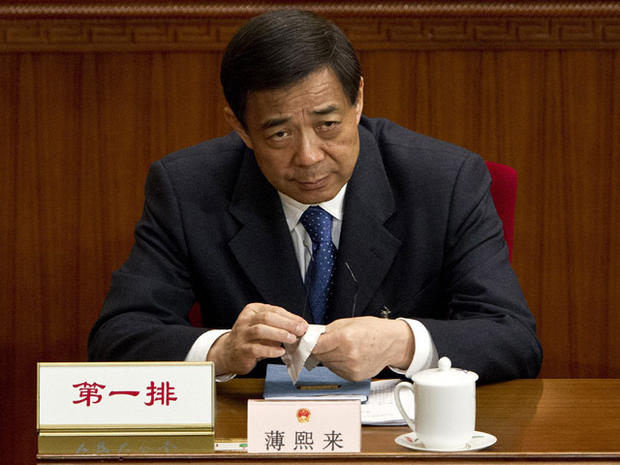Twists in China scandal jar party's projected image
Allegations that fallen Chinese official Bo Xilai engaged in the wiretapping of Communist Party elites not only add new intrigue to the political scandal set off by the mysterious death of a UK businessman, experts say it also complicates China's efforts to maintain political stability at home and promote its interests abroad.
The drama that began in February took a new turn Thursday, when The New York Times reported that it was the discovery of Bo's efforts to wiretap top Chinese leaders more than anything else that led to his ouster. According to the Times, evidence last August that Chinese President Hu Jintao was being monitored during a phone call led to an investigation that eventually implicated Bo.
"This fits into some patterns of both paranoia within the Chinese leadership and the divisions within the leadership that we were already hearing about," said Jeffrey Wasserstrom, a China specialist at the Asia Society.
Wasserstrom said the importance of the wiretap revelation lies less in what it reveals about Communist Party infighting, which he said certainly exists, than what it says about the inability of the one-party system to be transparent. And it's that lack of transparency and accountability that undermines Beijing's ability to rule the country long term, he said.
Wiretaps have not been part of the official version of Bo's ouster in March, which hinges instead on the alleged involvement of Bo's wife in the murder of British citizen Neil Heywood and allegations of corruption and abuse of power against Bo.
According to the Times, wiretaps were used widely in Chongqing, the southwestern metropolis where Bo was party leader (and where Heywood was found dead under mysterious circumstances at a mountaintop hotel on Nov. 15), put in place presumably to fight crime and maintain local political stability, though they were eventually turned on fellow party leaders.
Wasserstrom said the emergence of a new narrative featuring top Communist officials spying on each other will further erode public confidence because it contradicts the official party line -- denying any internal divisions -- and highlights a lack of political liberalization.
"The Chinese are really eager to see their country be seen as a modern, rational state," he said. "These kinds of things feel much too much like the kind of things that used to happen in an earlier period."
Of course, this all is unfolding against the backdrop of China's carefully orchestrated once-a-decade leadership change, with outgoing President Hu widely expected to be succeeded by Xi Jinping, the current vice president. It's difficult to determine the effect of Bo's ouster on the transition; in fact, it could be a product of the leadership change as officials in Beijing jockey for position within the party.
Former National Security Advisor Zbigniew Brzezinski said the episode complicates the transition. "But paradoxically perhaps it is a sign of progress," he said via email.
Another China watcher, Gordon Chang, said the Bo wiretap allegations and the implication of broad internal mistrust among party leaders also undermine China's credibility abroad.
"There is a perception among people around the world that China was modernizing, that it was institutionalizing itself, that its political system was becoming more normal," said Chang, the author of "The Coming Collapse of China." But with every new revelation in the Bo scandal "the party is delegitimizing itself."
Chang said China's allies, partners and even foes around the globe will be forced to question the reliability of Communist leadership. "That's going to be a problem because China really does depend on other countries for all sorts of things," he said.
The Obama administration has kept its distance from the whole affair, at least publicly.
"This is an issue within China," said White House spokesman Jay Carney on Thursday, responding to a question about wiretapping.
Despite the challenges it now faces, the Communist Party has proved itself to be an "amazingly resilient entity that has been able to manage and bounce back from these individual things," Wasserstrom said.
And perhaps that's the point.
Bard College foreign policy expert Walter Russel Mead, writing in his blog at The American Interest, views the ouster of Bo as a corrective action by China's leadership.
"The past three months have exposed Bo's Chongqing as a terrifying example of exactly what one possible future for China could look like," he writes.
More Coverage:
Fallen Chinese politician's son defends himself in letter to Harvard paper
Briton's death an ongoing embarrassment for China
China shuts down Twitter-like accounts amid political scandal
U.K. demands China probe Briton's murky death
China ousts top pol, accuses wife of murder
